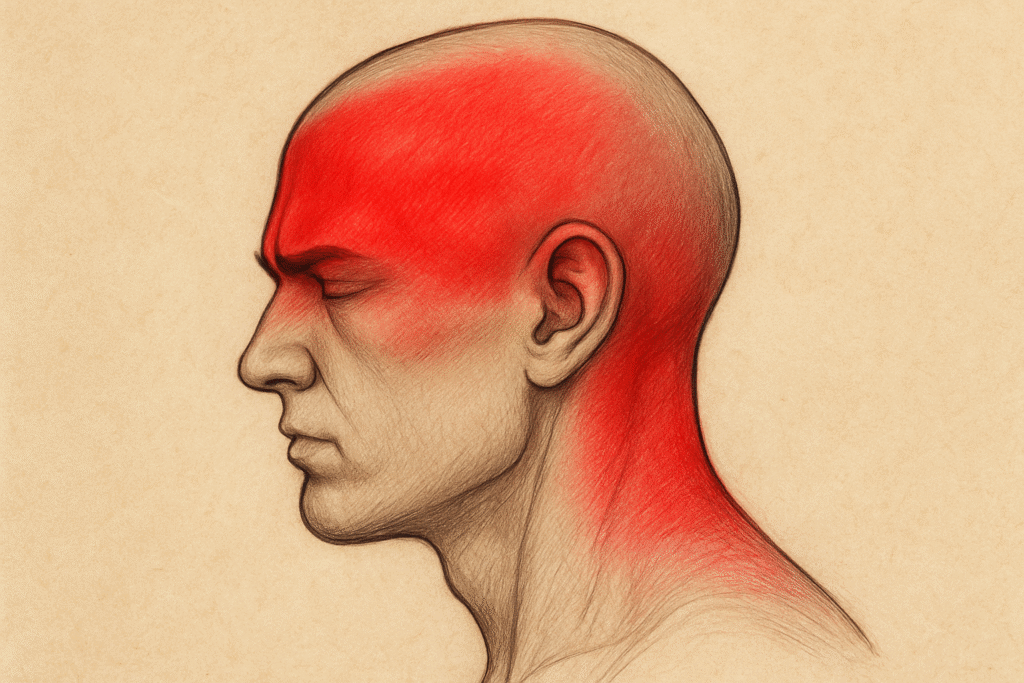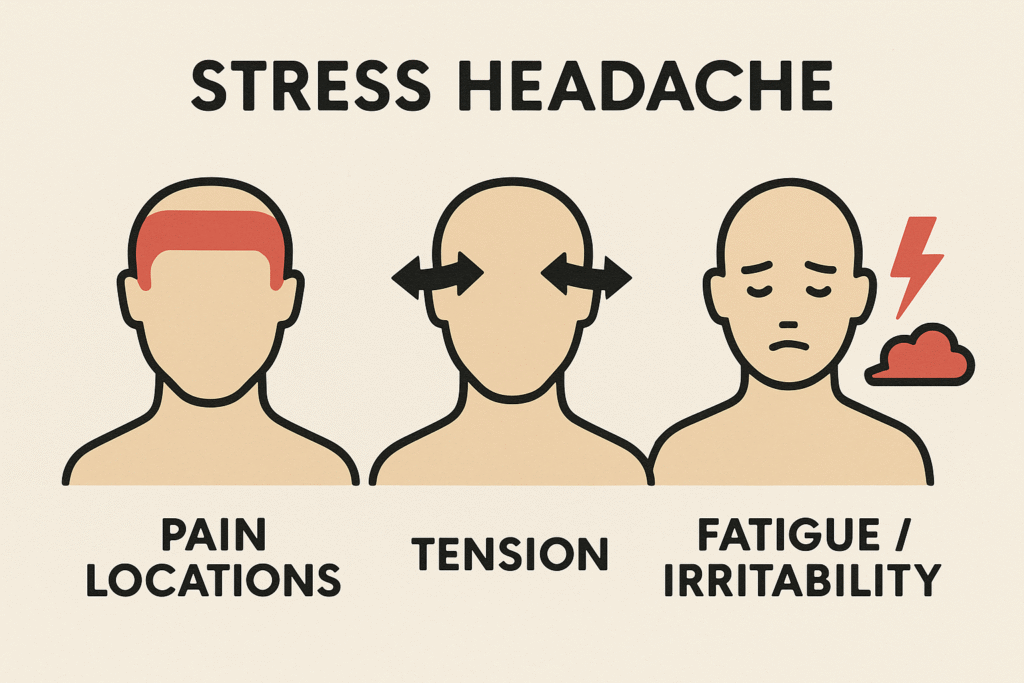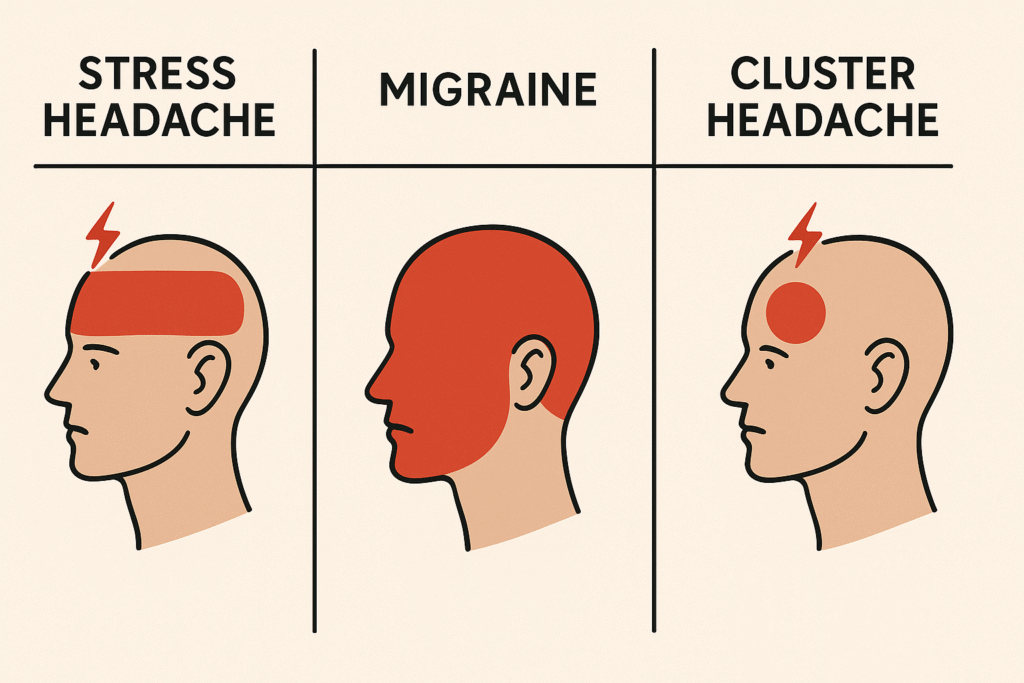- 1. What Are Stress Headaches?
- 2. Stress Headache Symptoms: What You’ll Notice
- 3. Why Does Stress Cause Headaches?
- 4. Stress Headache vs. Migraine vs. Tension Headache
- 5. Common Triggers for Stress Headaches
- 6. How to Get Relief from Stress Headaches
- 7. When to See a Doctor
- 8. Prevention: Tips to Avoid Stress Headaches
- 9. Frequently Asked Questions (FAQ)
- 10. References & Further Reading
1. What Are Stress Headaches?
If you’ve ever felt a dull, aching pain wrap around your head after a long day, you’re not alone. Stress headache symptoms are among the most common health complaints worldwide. These headaches often feel like a tight band around your forehead or the back of your head and can seriously impact your focus, mood, and energy.
Stress headaches—also called tension-type headaches—are headaches caused or triggered by stress, anxiety, or emotional tension. Unlike migraines, they usually aren’t severe enough to stop you from daily activities, but they can be persistent and draining.
Key Points:
- Stress headaches are the most common type of headache in adults.
- They’re often linked to muscle tension, poor posture, and emotional stress.
- Understanding stress headache symptoms is the first step to managing them.

2. Stress Headache Symptoms: What You’ll Notice
Identifying stress headache symptoms can help you get relief faster. Here’s what you’re most likely to feel:
Typical Stress Headache Symptoms:
- Dull, aching head pain: Often feels like constant pressure, not throbbing.
- Bilateral pain: Usually affects both sides of the head.
- Forehead band: Pain often wraps around the front, like wearing a tight band or hat.
- Tenderness: Scalp, neck, and shoulder muscles may be sore or tight.
- Mild to moderate intensity: Not as severe as migraines, but can last hours or even days.
- No nausea or vomiting: Unlike migraines, stress headaches don’t cause stomach upset.
- No aura: You won’t experience vision changes, flashes, or blind spots.
- Tightness or pressure: Many people feel tightness in the neck and shoulders.
- Trouble concentrating: The pain can make it hard to focus on work or daily tasks.
- Irritability and fatigue: Chronic pain can make you feel tired, moody, or frustrated.
Less Common, But Possible:
- Trouble sleeping (insomnia)
- Sensitivity to light or noise (mild, not as severe as migraine)
- Feeling of heaviness in the head
These stress headache symptoms often develop gradually and may worsen throughout the day.

3. Why Does Stress Cause Headaches?
The connection between stress and headaches is well established in medical research (Tylenol). Here’s how it works:
- Muscle tension: When you’re stressed, your body goes into “fight or flight” mode. This tightens muscles in your scalp, neck, and shoulders, leading to pain.
- Chemical changes: Stress can alter neurotransmitters (like serotonin and cortisol), making your nerves more sensitive to pain.
- Sleep disruption: Stress often leads to poor sleep, which can trigger headaches.
- Jaw clenching/teeth grinding: Many people clench their jaw or grind their teeth when anxious, leading to head pain.
- Poor posture: Stress at work can make you hunch over your desk, adding to muscle strain and headache risk.
Over time, chronic stress can make your body “expect” headaches, making them more frequent.

4. Stress Headache vs. Migraine vs. Tension Headache
Understanding the difference is crucial for proper treatment. Here’s a breakdown:
| Symptom | Stress Headache (Tension) | Migraine | Cluster Headache |
|---|---|---|---|
| Pain Type | Dull, steady ache | Throbbing, pulsing | Sharp, stabbing |
| Location | Both sides, forehead/neck | One side, behind eye | One side, often behind eye |
| Intensity | Mild to moderate | Moderate to severe | Severe |
| Duration | 30 mins – several days | 4–72 hours | 15 mins – 3 hours |
| Other Symptoms | Tension, tightness | Nausea, vomiting, aura | Tearing, nasal congestion |
Stress headaches are the same as “tension headaches”—the most common type. They differ from migraines, which are usually more intense and come with nausea, vision changes, or “aura.”
For more on headache types:
Excedrin – Headache Types
5. Common Triggers for Stress Headaches
To prevent stress headache symptoms, know your triggers. The most common include:
- Work pressure and deadlines
- Relationship or family stress
- Financial worries
- Major life changes (moving, loss, illness)
- Poor sleep or sleep schedule changes
- Skipping meals or dehydration
- Overuse of caffeine or alcohol
- Poor posture (especially at a desk)
- Lack of physical activity
- Chronic anxiety or depression
Learning to identify what brings on your stress headache symptoms can help you avoid or minimize them.
6. How to Get Relief from Stress Headaches
If you’re experiencing stress headache symptoms, here are some proven ways to find relief:
A. Quick Relief Strategies
- Over-the-counter pain relievers: Acetaminophen (Tylenol), ibuprofen, or aspirin can help. Use as directed.
- Gentle massage: Rub your temples, neck, and shoulders to release tension.
- Warm compress: Place a warm cloth or heating pad on your neck or forehead.
- Hydration: Drink a glass of water—dehydration can worsen headaches.
- Rest in a quiet, dark room: Close your eyes, breathe deeply, and relax.
B. Natural & Lifestyle Remedies
- Stress management: Practice relaxation techniques like deep breathing, meditation, or progressive muscle relaxation (Franciscan Health).
- Exercise: Regular physical activity can reduce both stress and headache frequency.
- Good sleep: Aim for 7–9 hours per night and keep a consistent schedule.
- Mindfulness: Try yoga, tai chi, or guided imagery.
- Posture correction: Set up an ergonomic workspace and take breaks to stretch.
- Limit caffeine and alcohol: These can both trigger and worsen headaches in some people.
C. When to Use Medication
- For frequent or severe headaches, your doctor may recommend prescription medications or preventive therapies. Don’t rely on over-the-counter drugs long-term without medical advice.
7. When to See a Doctor
While most stress headache symptoms are mild and manageable at home, sometimes you should seek medical attention:
- Headaches are frequent (more than 2–3 per week)
- Headaches interfere with work or daily life
- Pain is severe, sudden, or unusual
- Other symptoms present: fever, stiff neck, confusion, vision loss, weakness, numbness, or difficulty speaking
These could be signs of a more serious condition (such as migraine, sinus infection, or in rare cases, neurological issues).
Always consult a healthcare provider if you’re concerned or if your symptoms change.
8. Prevention: Tips to Avoid Stress Headaches
Preventing stress headache symptoms is about managing both physical and emotional stress. Try these proven prevention tips:
- Practice daily stress management: Meditation, journaling, or simply taking time for hobbies.
- Keep a headache diary: Track your headaches, triggers, and what helps. Patterns can reveal how to prevent future episodes.
- Stay physically active: Even short daily walks can reduce tension and improve mood.
- Eat regular, balanced meals: Don’t skip meals; low blood sugar can trigger headaches.
- Stay hydrated: Drink water throughout the day.
- Limit screen time: Take breaks every hour if you work on a computer.
- Maintain good posture: Use ergonomic chairs and set up your desk at the right height.
- Get regular sleep: Stick to a sleep routine, even on weekends.
- See a counselor or therapist if needed: Emotional support can help you manage stress.
- Eating well isn’t just good for your body—it can help your mood and headaches, too. Learn about the best foods that help with anxiety for more natural tips.
9. Frequently Asked Questions (FAQ)
Q1: What does a stress headache feel like?
A: Most people describe stress headache symptoms as a dull, constant ache or tight pressure on both sides of the head. It often feels like a tight band or heavy weight.
Q2: How long do stress headaches last?
A: Stress headaches can last from 30 minutes to several days. They may come and go with stress levels.
Q3: What are the most common stress headache symptoms?
A: Dull, aching pain (usually both sides), tightness in the scalp or neck, mild to moderate intensity, and no nausea or aura.
Q4: Are stress headaches dangerous?
A: Most are not dangerous and can be managed at home. However, severe, sudden, or changing headaches should be checked by a doctor.
Q5: How can I quickly relieve stress headache symptoms?
A: Rest, hydrate, gently massage your neck and temples, use a warm compress, or take over-the-counter pain relief as directed.
